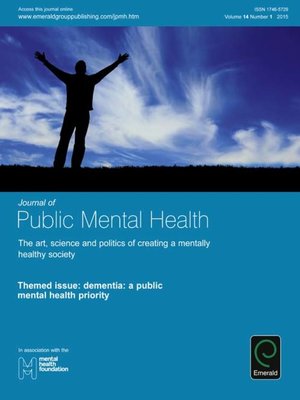Journal of Public Mental Health, Volume 14, Issue 1
ebook ∣ Dementia: A public mental health priority · Journal of Public Mental Health
By Woody Caan

Sign up to save your library
With an OverDrive account, you can save your favorite libraries for at-a-glance information about availability. Find out more about OverDrive accounts.
Find this title in Libby, the library reading app by OverDrive.



Search for a digital library with this title
Title found at these libraries:
| Library Name | Distance |
|---|---|
| Loading... |
Dementia is 'a global challenge and a public health priority' accordingly to Dr Margaret Chan, director general of the World Health Organization in a speech she delivered. Her sentiments are shared by many current political leaders including Barack Obama and David Cameron. Many countries including Australia, Japan, Korea, Netherlands, Norway, France and the UK have also recently published national dementia plans setting out their own strategies to tackle this challenge (Alzheimer's Disease International). The plan outlined by the Obama administration is possibly the most ambitious and has called for an effective treatment by 2025 (US Department of Health and Human Services 2011). The focus and widespread political consensus on dementia is surprising given that it is a condition where the aetiological mechanisms are not clearly delineated, and there is currently no treatment to reverse its effects. However dementia, especially research into the condition has been drawn into the spotlight, thus it is helpful to remind ourselves of the challenge and reflect on the research that still needs to be done.
Dementia is a term used to describe a set of symptoms that can include loss of memory, mood changes and problems with communication and reasoning. There are an estimated 35 million people with dementia worldwide, with approximately 800,000 in the UK, and 58% living in low or middle income countries. Initial estimates suggested that this figure would double in the next 20 years to 65 million by 2030, although more recent evidence from both North America and Europe, including the UK suggests that there may be a stabilisation of the numbers estimated to reach particular diagnostic criteria. It seems unlikely that these changes can expect to be the same across cultures and cohorts experiencing vastly different influences across the lifecourse.
There remain major gaps in the evidence base for a public health and prevention-focused approach to dementia, as highlighted by a number of groups including the Dementia Priority Setting Partnership (a consortium initiated by the Cambridgeshire and Peterborough Collaborative Leadership in Applied Health Research and Care and the Alzheimer's Society, in collaboration with the James Lind Alliance), the MRC's Ministerial Group in Dementia Research (MAGDR) which is now the Dementia Challenge Research Committee (chaired by Dame Sally Davies), and the NIHR dementia research workshop which identified priorities for research related to the cause, cure and care of people with dementia, including research on health service development and community engagement. Specific areas where further research is required are in ethnic minority groups which are typically under-represented as well as studies that in low and middle incomes countries which bear the burden of prevalent cases.
Political will has created an opportunity to tackle this public health issue, and the expansion of investment in research aimed at reducing the impact of dementia is welcomed. For example research aimed at reducing health inequalities and improving the experience of living with dementia will have an effect on quality of life for people with dementia and may have a lasting impact on prevalence. However the added sense of urgency that political leadership also risks subverting the usual process of generating health policy and advocating public health interventions arising from robust scientific evidence. We must be careful not to let the policy cart come before the research horse, otherwise we risk squandering the opportunity that we have to make a step change in dementia research and care for dementia patients.







